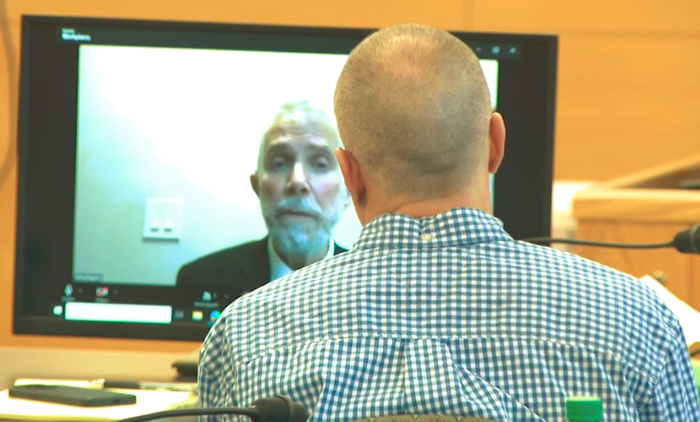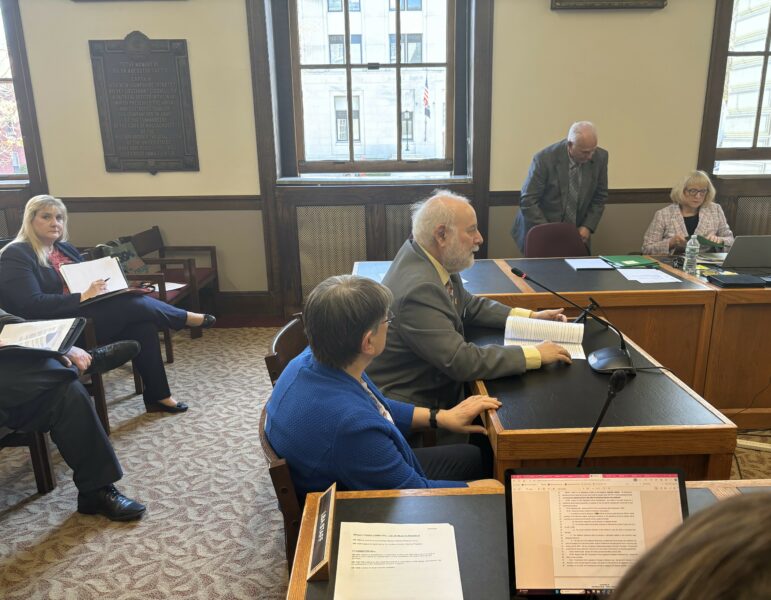
By GARRY RAYNO, InDepthNH.org
CONCORD – Former United States Supreme Court Justice Potter Stewart; “Ethics is knowing the difference between what you have a right to do and what is right to do.”
New Hampshire lawmakers may be facing more stringent ethics guidelines going forward after a recent ruling by the Legislative Ethics Committee.
The ruling resolves a complaint filed against House Majority Leader Douglas Ley, the president of the American Federation of Teachers — New Hampshire by Christopher Mazerall, a Jaffrey Republican who lost to Jaffrey Democrats Ley and Dick Ames for the Cheshire District 9 seat in the 2018 election.
Mazerall claimed Ley’s role as union president and his activities supporting and opposing various bills violated legislative ethics guidelines.
The ethics committee found that Ley did violate ethics guidelines in three of the four examples cited by Mazerall but did not discipline him instead seeking his agreement to refrain from such activities in the future, which Ley agreed to do.
The examples where Ley was found to have violated ethics guidelines included bills involving right-to-work, union dues and paid and family leave, but not “education savings accounts” or school vouchers.
Since the legislature established ethics guidelines back in the late 1980s, lawmakers’ ability to participate legislatively in issues dealing with their work, or their expertise has lacked a “bright line.”
The idea of a citizen legislature is to draw people from many walks of life, occupations and interests to participate in the legislative process, with the hope the end result is a better product.
At $100 a year in compensation, the result has been mixed as most working people cannot afford to spend three days a week for six months in Concord nor able to allocate the time needed.
Over the years, the lack of pay made the demographics of the House more “elderly” and male than average and also more susceptible to “paid experts” who ran to either look out for their own business or personal interests or those of their employers.
For example, my uncle was a representative and he wanted and had a seat on the Fish and Game Committee believing he would know before others where the department stocked fish. That didn’t work out so well and he decided not to seek a second term.
However other representatives and senators were employed by various industries or organizations to look out for their interest before the legislature, although the information available on the internet has stymied those arrangements somewhat.
Representatives and Senators are expected to serve and represent their constituents, but does that also include serving your community’s largest employer?
As a representative do you protect the interests of Eversource if you represent Manchester or BAE Systems if you represent Nashua, etc.?
With the number of senior citizens in the General Court, do these lawmakers have conflicts of interest if they vote to continue free access to the state park system, or on elderly tax exemptions, or even matters involving the state retirement system?
Ley’s situation is a little more complicated because he is a paid employee whose job is to advocate for members of his union. The person who held the post prior to Ley registered as a lobbyist, but Ley has not and could not as a representative.
The committee ruling notes the situation is not always clear.
“Certainly, when you advocate for or vote on union-related matters, your position as President of AFT-NH creates an apparent conflict of interest. But, as you correctly pointed out to the committee, it is not uncommon for legislators to have associations with particular industries, businesses or organizations. We encourage people with special knowledge to participate in our citizen legislature,” Ethics Committee Chair Rep. Ned Gordon, R-Bristol, writes.
“In adopting the Ethics Guidelines, the Legislature has placed an emphasis on disclosure, not on disqualification. There is no bright line stating when a legislator must refrain from participation in legislative matters. However, the Committee has found in the past that, under certain circumstances, recusal is the required course of action.”
The ethics committee found that Ley did violate ethics guidelines in voting and working against right-to-work legislation which prohibits unions from collecting administrative fees from non-members for negotiating and administering collective bargaining agreements.
The committee said the legislation had a direct effect on his employer and Ley should have recused himself instead of declaring a conflict and participating.
Similarly, the committee found Ley violated ethics guidelines when he voted against a bill that would have prohibited automatic collection of union dues from state employees, and when he participated in committee work on a bill for paid medical and family leave for educators.
But his participation on a bill establishing school vouchers did not violate ethics guidelines. “While your union’s membership undoubtedly has an interest in promoting education, the Committee does not find that the union will receive any direct benefit from Education Savings Accounts,” Gordon wrote.
Given the three examples, the committee appears to be drawing a line between direct financial benefit or harm and policy.
If that is true, then lawmakers who are small business owners liable to pay business profits or enterprise taxes should not be voting on rate increases or decreases or carry forward losses or payment thresholds that currently exempt companies earning less than $50,000 from paying the business enterprise tax.
Similarly, doctors or other medical providers who serve in the legislature or who have family members who are, should be recusing themselves from issues such as Medicaid reimbursement rates or changes in the Medicaid program that have financial consequences.
And insurance brokers or underwriters would also be subject to greater scrutiny and recusals themselves more from financial issues or policies that could be beneficial or harm their company or their employer.
And there is also the issue of state, county or municipal officials or employees and how changes to the state retirement system could impact them as an example.
Should all former public workers who participate in the retirement system recuse themselves from bills that could impact their current or future benefits?
The committee explained its thought process this way in the ruling.
“We should not allow a compensated employee who is paid to advocate for his or her employer to participate in matters directly related to his or her employer. At the same time, recusal is required only when matters directly affect your employer,” Gordon writes.
“In your case, as union president, you are precluded from participating in union related legislation such as matters involving union fees, dues or membership. Because your union largely consists of teachers, you would be precluded from participating in issues which directly benefit them. On the other hand, you would not be precluded from participating in general matters involving education.”
While those who believe unions have too much power and influence, such as Americans for Prosperity, are celebrating the ruling, it goes far beyond unions.
In this hyper partisan time, there will probably be many more of these complaints filed in the coming session.
Groups and organizations are likely to do due diligence on the backgrounds of their opponents on key issues seeking to eliminate as many opposing votes as possible.
And although fewer and fewer reporters walk the halls of the State House, they may find fertile material for stories under this ruling.
The citizen legislature never really was that and this ruling reinforces the notion the professional nature of members of the General Court and how they have been able to do their own or their employers’ bidding without much scrutiny.
Garry Rayno may be reached at garry.rayno@yahoo.com
Distant Dome by veteran journalist Garry Rayno explores a broader perspective on the State House and state happenings for InDepthNH.org. Over his three-decade career, Rayno covered the NH State House for the New Hampshire Union Leader and Foster’s Daily Democrat. During his career, his coverage spanned the news spectrum, from local planning, school and select boards, to national issues such as electric industry deregulation and Presidential primaries. Rayno lives with his wife Carolyn in New London. InDepthNH.org is New Hampshire’s only nonprofit, online news outlet dedicated to holding government accountable and giving voice to marginalized people, places and ideas.





